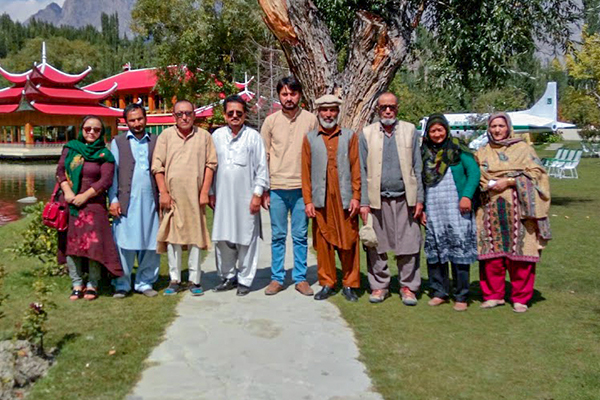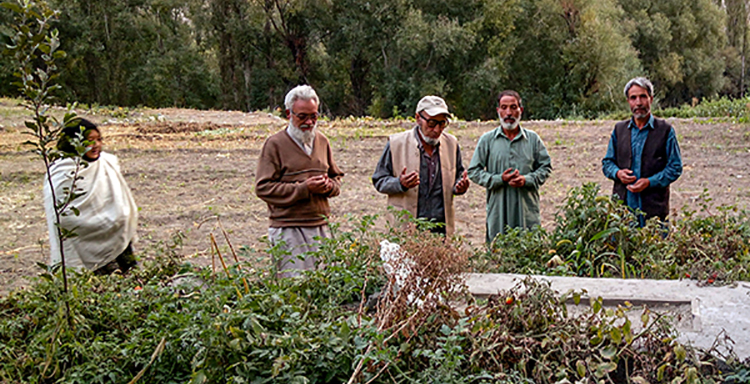The lingering pain of Partition

The Partition of India and Pakistan was not just a separation of land but also a division of thousands of families. The mainstream discourse on Partition and divided families primarily focus on Punjab, Jammu and Kashmir valley. The pain and anguish of divided families in Ladakh and Baltistan rarely receive a mention. This is a personal issue for me. My grandfather, the late Haji Abdul Hamid (1 December, 1938 to 18 May, 2020) lived with the pain of separation from his father after the ceasefire line was drawn in 1949 to separate India and Pakistan.
My grandfather was born in Padum, Zangskar in 1938. He was the only brother to his three sisters. News of the horrors of the Hindu-Muslim riots that marked the Partition started to reach reached Zangskar valley in 1947. The valley has Himachal Pradesh in the south and Kashmir in the west. These horrific stories ignited fear amongst the minority Muslim community in Padum. A group of men from the community decided to get organised to protect themselves in case the violence reached Padum. My great-grandfather, the late Habibullah was one of these men. In 1948, members of Gilgit Scouts, with support from the newly-formed Pakistan, reached Kargil and a few of them proceeded to Zangskar. In Padum, some members of the Muslim community viewed these individuals with hope in the context of the communally-charged atmosphere in the Indian subcontinent in the wake of the Partition.
We shall keep the story of how this small contingent of Gilgit Scouts survived in Padum for another day. In the summer of 1949, Indian troops managed to push Pakistani forces from Kashmir and Ladakh and they allowed a safe passage to the Gilgit Scouts troops in Padum. Some men from Padum’s Muslim community decided to join these retreating troops. This included my great-grandfather. My grandfather was 11-years-old at the time. Before he could comprehend what was happening, my grandfather was left behind in Padum with his mother and three sisters. The group from Padum travelled with the retreating Gilgit Scouts troops along the Kargil-Skardo road. The letters written by them at the time suggest that they did not intend to settle down in Baltistan but planned to return to Padum once the conflict ended. Unfortunately, the conflict ended with the creation of the ceasefire that separated Gilgit-Baltistan and Ladakh. Subsequent conflicts between India and Pakistan extinguished any hope of their return.
In the absence of his father, all responsibility for the family fell on my grandfather. Once my great-grandfather realised that he was not going to be able to return to Zangskar, he married a local girl in Baltistan and settled in Sermik. The following years were tough for the family as there was no communication between them across the Line of Control (LoC). Slowly, the finality of his father’s absence dawned on my grandfather. He yearned to meet him and the death of his mother within a few years further intensified his pain and anguish. In those days, there were no means to earn daily wages in Padum. So a few years later, after his marriage, my grandfather moved to Himachal Pradesh in search of work. During our storytelling sessions, he would describe this practice of moving out for work. He would mention that the Muslims of Padum would generally travel for work to Chamba in Himachal. Once his children had grown up, my grandfather travelled to Leh to train as a veterinary assistant. He hoped to save enough money to someday travel to Baltistan and meet his father. Once he returned to Padum, he worked as a veterinary assistant as well as an Amchi (traditional Tibetan medicine system) dentist in the absence of doctors in the region. He also opened the first hotel in Zangskar by the name of Hotel Greenland. He would often mention the hotel to his father in letters they exchanged in chaste Urdu. On the other side, Habibullah proudly recounted these stories to his children—two sons and a daughter with his second wife—in Sermik.

(Top photo) Family members from both sides of the LoC at their reunion in Skardu, Baltistan
The deteriorating relationship between India and Pakistan crushed all hopes that father and son had nurtured of meeting face-to-face. Habibullah passed away on 17 December 1987 with an unfulfilled longing to meet his family in Padum, especially his son. On this side, the death of his father shattered my grandfather. He still did not lose hope and continued exchanging letters with his step-siblings in Sermik. Since there was no formal system to exchange post between India and Pakistan at the time, the only way to send letters and gifts to relatives across the LoC was through Haj pilgrims who would hand them over to pilgrims from the other side. I grew up listening to my grandfather’s stories of pain and anguish in the wake of the Partition. His love for storytelling and my interest in these stories made me one of my grandfather’s closest confidants.
Let us now fast forward to 2009 by which time the internet had started reaching these remote mountain regions. One of my cousins from Sermik was in Islamabad at the time. He remembered ‘Hotel Greenland’ being mentioned by his mother and decided to search for it online. Since the hotel was no longer functional by this time, he found nothing online. He then collected the names of other hotels in Padum and started mailing them to ask about Hotel Greenland. One of these hotels suggested that he get in touch with me. We managed to get in touch with each other and continued speaking over social media. During these conversations, I learnt that our relatives on the other side of the LoC were yearning to meet my grandfather.
This was around the time I had started my doctoral research on the topic that has always fascinated me: India-Pakistan relations. One of my case studies was to understand the impact of theatre groups on cultural diplomacy between the two countries. By 2014, I was able to establish contacts in Pakistan for my study and I was able to accompany a theatre group that was invited to perform at a festival in Karachi organised by the famous theatre activist, Sheema Kermani. It was during this trip that I met with my cousin for the first time in Lahore and he accompanied us for the whole journey. During our time together we started discussing the possibility of organising a trip for my grandfather to visit Baltistan.
Once I returned to India, I kept exploring ways to make this dream a reality. During our conversations, my grandfather would often say, “I have fulfilled all my responsibilities and even performed the Haj thrice. Now, my only wish is to visit my father’s grave.” Around this time I attended an event on India-Pakistan relations in Delhi, where the late Madeeha Gauhar of the Ajoka Theatre in Lahore was also invited. At this event, she introduced me to someone from the Pakistani embassy in Delhi. I mentioned my case to him and he promised to help. In due course, we completed all formalities and in September 2017, my grandfather, parents and me finally embarked on a journey to Baltistan. We travelled along the Amritsar-Wagah-Lahore-Islamabad-Muree-Khyber Pakhtunkhwa-Babusar-top-Chilas-Skardo-Sermik route. It took us almost a week to complete this journey.
A caravan of vehicles from Sermik was waiting to welcome us in Skardo. It was as if the whole village was there to greet us. The moment I saw my grandfather hugging his brothers tightly, I realised that his ‘last wish’ was starting to come true. When we reached Sermik, people crowded around us and kept touching us to check if they were dreaming. I could see questions in their eyes as tears of happiness and sadness mixed freely in the village that night. I was surprised to learn that there is a Padum community in Baltistan—these are the descendants of the men from Padum who had settled there. Those men have all passed away and their families are now scattered across Baltistan but all of them proudly call themselves “Zangskar-pa”.
We visited the graves of many of the men from Padum. For me, it was most satisfying to watch my grandfather visit his father’s grave, which was marked with bold Urdu letters stating: “Habibullah, Padum Zanskar”. There were tears of joy and pain. It felt like a circle was finally complete and his yearnings and pain finally eased after that ‘union’. The news of our arrival spread like wildfire and from the very next day to the day of our return, we had a stream of visitors from every corner of Baltistan. We also travelled to different areas to meet people from the Padum community and collect their letters and gifts for their relatives in Zangskar.
This was the most emotionally satisfying journey for all of us. We then returned to India and continue to remain in touch with our relatives in Baltistan through social media networks.
The trip to Baltistan happened at the right time for my grandfather. He remained ill for almost a year from 2019. In February 2020, he had to be air-lifted from Padum and admitted to the Sher-i-Kashmir Institute of Medical Sciences in Kashmir. He then returned to Padum and breathed his last on 18 May, 2020 in his beloved homeland.
All said and done, he was most satisfied that he was able to travel to Baltistan. Today, when he is no more, the Padum community in Sermik and people in Padum, Zangskar are together in mourning his passing. After all, he was one of the only people who have been able to make that long and rigorous journey to Sermik to connect the dots and pray at his father’s grave. That journey has set the ball rolling and opened avenues for other families to dare to dream about meeting their relatives on the other side of the LoC.
Photograph and text by Dr. Zainab Akhter
Dr. Zainab Akhter works at the Manohar Parrikar Institute for Defense Studies and Analyses, New Delhi.

Very interesting and touching account. I can understand the pain of families who got separated due to partition. I still remember the emotional meeting of Ghani Sheikh of Leh with his long separated brother living in Baltistan in Islamabad In 1995. Similarly, I met a gentleman from Skardu in Sabu village in 1979 who was visiting Ladakh to meet his brothers after a long time. All these accounts are very emotional and my best wishes to all such families and pray that they are able to meet more freely.
Thank you for your comment Mr Singh.